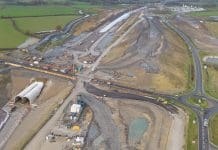More and more UK contractors are implementing modular construction practices into their operations, construction software provider, Viewpoint explores
Modular construction, or offsite construction, is a method of construction that relies on the components being assembled in a factory under controlled conditions and then being finalised on-site. The initial process is also referred to as offsite manufacture for construction or OSM.
Sounds like some strange sci-fi fiction, but it’s becoming more commonplace. In fact, Business Insider predicts that modular construction will have a global worth of around $142bn by 2024.
A brief history
Modular construction has been around for a surprisingly long time. Its first recorded use was back in the 1600s. In 1624, an English fisherman brought a house with him to Cape Ann in what is now the United States, and it was disassembled and reassembled several times after this.
More recently, ‘prefabrication’ is the term that springs to many minds when discussing buildings that are assembled on-site. The concept may have been around for hundreds of years, but this new generation of offsite construction aims to push the boundaries of design, engineering, and sustainability — things that will prove essential for construction and its image in the coming years.
Benefits of modular construction
More and more UK contractors are implementing modular and prefabrication practices into their construction operations as there are a number of benefits in doing so. Here’s a quick look at just some:
Quicker turnaround
One advantage of offsite construction is that the time on site is minimised and therefore a project’s length can be reduced. If done correctly, this means subcontractors won’t have to wait around for another subcontractor to finish their tasks on the build. By their very nature, these builds are efficient, meticulously planned, and usually utilise modern technology to ensure there aren’t any delays once construction does begin on the final site.
Due to a larger proportion of the project being completed in a factory setting, it is less likely to be delayed due to adverse weather conditions — something all too common on UK building sites thanks to the great British weather. Although this is something often factored into construction insurance, it nevertheless causes a ripple effect of delays that can affect far beyond the root project.
More sustainable
According to The Waste and Resources Action Programme (WRAP), up to 67% less energy is required to produce a modular building compared to a traditionally built building from start to finish. Also, modular projects being completed quicker means energy usage is reduced at the project site.
WRAP also predicts up to a 90% reduction in materials can be achieved through the use of modular construction. By the nature of modular buildings, many can be disassembled and moved elsewhere at a future date. This means they’re durable, reusable and contribute to a cyclical method of construction that aims to minimise waste.
Repeatable quality
Anything that has human involvement is inevitably prone to mistakes — this can’t ever be completely eradicated. However, by reducing the amount of construction that is undertaken on-site, more of the checks can be carried out in a factory setting and therefore improve first-time quality on items.
When this is paired with a field productivity and quality tool, such as Viewpoint’s Field View solution, this culture of first-time quality and accountability can be easily carried through a project. Construction is changing dramatically, and the opportunity for contractors to work alongside technology could give them an exciting advantage when it comes to delivering repeatable quality for its customers and the end-users.
Watch this space
With the modular construction industry set to keep growing, it will be interesting to see how far-reaching its influence can be. Today, modular is mainly reserved for residential projects, but as the industry matures, the possibilities will be vast.
In part two of this blog series, we’ll discuss the government initiatives that are fuelling the fire for Modern Methods of Construction (MMC) and how technology aids offsite construction.
Tamara Higham
Marketing executive














